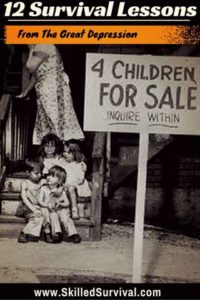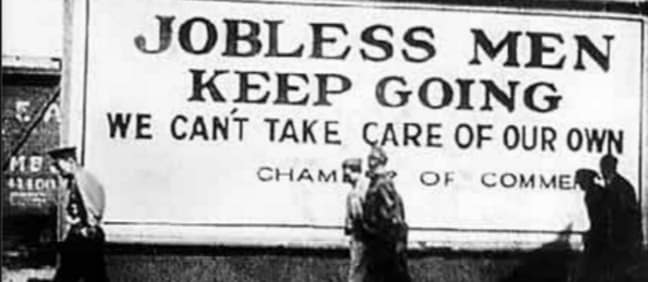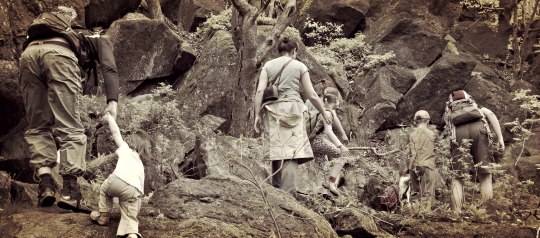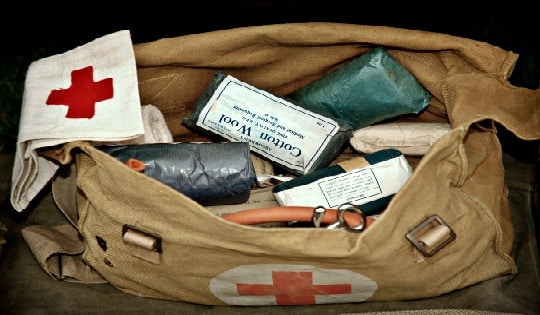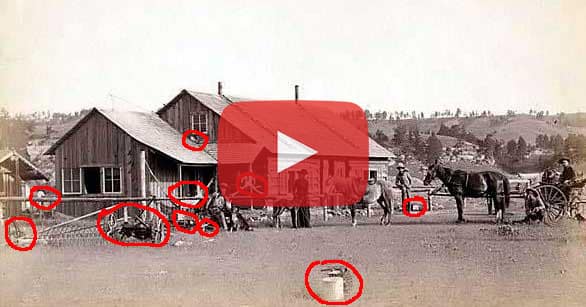Today I’ve got something really incredible to share…
12 Vital Lessons You Can Learn From The Great Depression
Because starting in the year 1929, the United States fell and fell hard.
This event in history was infamously coined “The Great Depression.”
It became known as the worst US economic disaster of modern times.
EVERYONE suffered; in fact, many died!
But IF you learn some lessons from the past, YOU don’t have to be a helpless victim…
LESSONS IN THIS ARTICLE… ↓(click to jump)
- A Brief Introduction
- 1. “Job Security” Is A Myth
- 2. Self-Defense Matters…
- 3. Diversify Your Skill Set
- 4. You Must Mentally Prepare
- 5. You Need Strong Family Bonds
- 6. Honest Work IS Hard To Find
- 7. Vices Were In High Demand
- 8. How To Stretch Your Dollars
- 9. Diets and Health Suffered
- 10. Mass Migration IS Common
- 11. New Art Is A Silver Lining
- 12. Self-Reliance Is Important
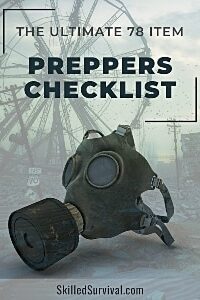
Want a free 78 item prepper checklist?
Click here to instantly download this Complete Checklist PDF. No purchase necessary.Brief Introduction To The Great Depression
There is no American who isn’t aware of The Great Depression…
Why? Because it was an even that touched every American life.
Everyone was effected to the core.
The Great Depression brought the prosperous American empire to its knees.
Money and industry dried up almost overnight, along with the nation’s food resources.
It was the worst of times to be an American.
↓ Ways People Survived the Great Depression
In reality, the probability of a similar economic disaster shaking this nation again is not as low as you might imagine.
Sure, there are new checks and balances – “safety valves” to ensure that the US stock market can’t crash as fast.
But even as recently as 2008, America’s economy was badly shaken and sank once again via The Great Rescission.
But the truth of the matter is Wall Street and big banks never actually learn the lessons of the past.
And with Fed holding interest rates at or near zero (when this article was published), the government’s bag of tricks is running on empty.
The next economic fall could match or exceed that of The Great Depression.
History often repeats itself, and the best way to avoid past suffering is to learn from our forbearers’ mistakes and prepare ourselves for harder times yet to come.
As Edmond Burke once famously quoted,
“Those who don’t know history are doomed to repeat it.”
1. “Job Security” Is A Dangerous Myth
The stock market is just a numerical representation of reality.
When it crashes, the underlying businesses that make up the stock exchange struggle to perform.
And once a crash starts, it isn’t easy to stop.
When fear turns into all-out panic, people stop spending, leading to lower business profits, pushing stock prices even lower, and even less spending.
Economic depression is a vicious cycle where businesses are not selling their inventories because people are not buying.
All businesses will immediately start downsizing their staff to help offset their future drop in revenues.
The weaker businesses will find that massive layoffs are not enough.
They can’t keep the doors open, and everyone who worked for them is out of a job.
This downward cycle ushered in the era of The Great Depression.
Unemployment rates skyrocketed. The unemployed masses spent their remaining savings on only the bare essentials (i.e., food, rent) until even those dollars ran out.
After that, many were left with shanty towns and food lines as their only remaining options.
So even if you think your job is secure, are you 100% certain?
Let’s imagine that your company does survive but, to do so, must lay off a few employees from each department.
How can you be certain you won’t be among those few?
- You might be let go if you’re a relatively young employee because “you’ll land on your feet.”
- If you’re a more seasoned employee, cutting your salary will make a bigger difference to a struggling business’s bottom line.
You can’t assume how these things will shake out…
↓ The Great Depression – 5-Minute History Lesson
In stable times, people like to talk about their “job security.”
They fool themselves into believing their job or industry can weather any storm. It’s a suckers bet.
Instead, you should assume that you could lose your job in an instant and live, plan, and prepare accordingly.
2. Self-Defense Matters In Tough Times
As times got tougher, people got more desperate.
People who could not afford to feed themselves or their families were forced to more extreme means of providing or risk starvation.
Organized crime took off like a rocket ship.
The mobs in New York and California became some of the wealthiest organizations in the country because of their control of the liquor smuggling operations.
Desperate times call for desperate measures for surviving The Great Depression.
A father or mother with starving children will abandon their morals and steal from others.
You should assume your resources will come under attack.
Especially if you’ve stockpiled food, vital supplies, and resources others want. Get prepared to protect what’s yours.

Want a free 78 item prepper checklist?
Click here to instantly download this Complete Checklist PDF. No purchase necessary.3. Diversify Your Skill Set
Many of the previous well-off families were forced into lives of extreme poverty.
As the cushy jobs vanished and monetary assets tanked, people with no useful skills suffered the most.
Previously wealthy parents watched in horror as their children died of starvation or illnesses they could not afford to fight off.
Mothers and fathers died by sacrificing their own needs for their children.
Leaving their children alone to fend for themselves.
You’ll need to figure out how to make a living when times get tough.
Learn how to provide an essential service to others and trade or barter for it.
Figure out how to secure critical resources and turn those into necessary goods or services.
It’s best if you acquire those self-reliant survival skills today.
If you wait, it may be too late.
↓ 10 Great Depression Skills That Will Pay Well
4. You Must Stay Mentally Prepared
Brothers and sisters, lovers, and friends were subject to extreme suffering and (as the name of the era implies) depression.
Many folks were not equipped to handle the cultural shift from prosperity to poverty – or chose not to – and opted to take their own lives.
If you want to be a rock in a sea of misery, you need to sharpen your mind.
The best way to do this is through the philosophy of Stoicism.
One aspect of Stoicism promotes the practice of self-deprivation during good times to mentally prepare you for bad times.
One such example is fasting for a week.
To experience the sensation of extreme hunger and understand that while uncomfortable in the short term, it’s survivable.
A second example would be to sleep for a week on a cold hard floor and not in a soft, comfortable bed.
This practice will help strengthen your resolve and spirit should that become your reality.
Not only will this practice give you more appreciation for the good things you have in your life today.
But it will also provide mental preparations when life’s circumstances take a turn for the worst.
For those who want to learn more about this topic. Check out “The Obstacle Is The Way” by Ryan Holiday.
A modern-day book rooted in Stoic concepts.
5. You Need Strong Family Bonds
Marriage rates early on in the Great Depression plummeted.
Why? Because single men could not afford to support themselves, let alone a family.
So proposals dried up and became something of a rarity from 1929 to 1934.
Surprisingly, divorce rates throughout the era decreased!
However, this has been attributed to spousal abandonment.
Men did not have the means to leave their wives legally.
So while formal divorce rates were low, abandonment rates during the Great Depression were at an all-time high.
The Great Depression brought about a lot of “poor man’s divorces” and a surplus of single ladies.
If you want to stay with your spouse through such trying times, then focus on strengthening your bonds of love, trust, and communication today.

Want a free 78 item prepper checklist?
Click here to instantly download this Complete Checklist PDF. No purchase necessary.6. Honest Work Can Be Hard To Find
Single or abandoned women experience especially hard times.
Being a woman in that era made it harder to get work.
And if work could be found, they rarely got paid a decent wage.
Making women exponentially more vulnerable to moral compromises.
Which leads to rising rates of prostitution across the US.
Many women who could not find honest work turned to “the oldest profession in history.”
It was a desperate means to surviving The Great Depression.
Again, having some active and useful skills can help avoid the toughest compromises.
Sewing, gardening, seed saving, farming, butchering, etc.
These are just a few self-reliance skills that can help offset costs and maybe even make a small profit.
7. Vices Were In High Demand
Rates of alcoholism escalated despite the prohibition laws that were enforced in the US at this time.
Most of the available booze was expensive, diluted, or homebrewed hooch.
These have shortcomings, most of which were controlled by the mob or independent bootleggers.
Neither of whom was good folk to owe money to.
And amazingly, regardless of all that, the number of alcoholic Americans rose steadily throughout the Depression.
When times are tough, many people peer down the bottom of a bottle looking for answers.
So if you happen to have a stockpile of these highly desirable vices, you can sell or trade them at a nice profit to help keep your loved ones safe.
↓ The Great Depression in COLOR
8. How To Stretch Your Dollars
Many Americans switched from more expensive cigars to smoking cigarettes, which were significantly cheaper.
Not that one or the other is better for you, but it proves an interesting trend.
In trying times, people make certain compromises.
They can no longer afford luxury for luxury’s sake.
Instead, they downgraded to cheaper options while surviving The Great Depression in an attempt to stretch what little was left.
Learning how to stretch your dollars today effectively can help prepare you for the tough times ahead.
Eliminating unnecessary food and energy waste. Limiting the number of miles you drive your car.
The bottom line:
Living an efficient life.
↓ Weird Foods People Ate to Get Through the Great Depression
All these ideas will help you keep more of your hard-earned dollars today and make them last longer tomorrow.
Lesson 9. Diets and Health Suffered
Obviously, preventative health care was not high on anyone’s priority list, so the general health of the American population from 1930 to 1933 suffered greatly.
No one bothered going to the doctor unless it was a serious emergency.
Doctors cost money, as do medicine and dental work.
Instead, money was allocated to short-term essentials such as food, rent, and clothes – the important stuff.
While I never advocate skipping doctor or dentist visits, you can help keep visit costs low with good personal hygiene.
↓ What Hygiene Was Like During The Great Depression
Keep a well-supplied and updated medical kit in your home at all times.
Continue regular dental hygiene and eat a balanced diet.
These actions will help keep your immune system in good working order.
Plan on stockpiling essential health-related supplies (like survival antibiotics) and then smartly rationing them during hard times.

Want a free 78 item prepper checklist?
Click here to instantly download this Complete Checklist PDF. No purchase necessary.Lesson 10. Mass Migration Was Common
Mass migration physically rearranged and shuffled the demographics of America like a professional blackjack dealer.
The Great Depression was an era of movement and vagrancy, a time when jobs were sought out by adventurers who train-hopped from one town to the next or walked the roads and hitchhiked when they could.
Caravan loads of migrants moved westward, from the east, towards a new life in California.
John Steinbeck described the migrations impeccably well in his 1939 novel Grapes of Wrath:
And then the dispossessed were drawn west – from Kansas, Oklahoma, Texas, New Mexico; from Nevada and Arkansas, families, tribes, dusted out, tractored out. Car-loads, caravans, homeless and hungry; twenty thousand and fifty thousand and a hundred thousand and two hundred thousand.
They streamed over the mountains, hungry and restless as ants, scurrying to find work to do – to lift, to push, to pick, to cut – anything, any burden to bear, for food.
The kids are hungry. We got no place to live. Like ants scurrying for work, for food, and most of all for land.
When local prospects are nil, you must move to survive.
If you would prefer to avoid such a fate, then focus on your family’s self-reliance. If you can thrive where you are, then you’ll have no reason to join the masses.
Lesson 11. Creative Art Is A Silver Lining
People went to more movies during the Great Depression. Americans went to at least one movie weekly on average (often more).
It was a way to escape from the sad realities of life during the Great Depression for an hour or two.
It was a chance to laugh with other people, get excited, frightened, angry, or sad with a crowd of strangers and friends.
Cinema during the Depression was a flickering, dancing light in a very dark corner of time.
There were a lot of classic films that came out of the Depression.
Movies like Frankenstein, It Happened One Night, Gone With The Wind, King Kong, The Wizard of Oz, and Dracula.
There were also a lot of great works of literary art as a result of the Depression.
John Steinbeck wrote some classic novels about the Depression and the Dust Bowl, like Of Mice and Men, East of Eden, and The Grapes of Wrath.
↓ The Dust Bowl and the Depression
Some of the most impactful photographs came from this era as well, like:
- Dorothea Lange
- Walker Evans
- Arthur Rothstein
- Ben Shahn
- John Vachon
- Russel Lee
- Gordon Parks
They’re among some of the most recognizable Great Depression photographers.
However, symphonic music, which was in high fashion throughout the ’20s, suffered severely from depression.
Paying for symphony tickets was largely out of the question; getting dressed up was a superfluous endeavor.
Besides all of that, advancements in Radio Tech meant that most music lovers could get different stations right in their living rooms.
The one positive product of tragic events, intense situations, and weird history like that of surviving The Great Depression is the art that it invariably bears.
War, natural disaster, economic meltdown, famine, genocide, and anything else so gruesomely depraved will always inspire the creative soul.

Want a free 78 item prepper checklist?
Click here to instantly download this Complete Checklist PDF. No purchase necessary.Lesson 12. Self-Reliance Is Key
The biggest hurdle of surviving The Great Depression was simple: lives changed drastically – and they changed fast.
Americans went from the lavish roaring twenties, where elegance and jazzy splendor perfused the nation, to scrubbing out a meager existence.
Those who survived it were never the same.
They stockpiled more and reused more.
Most shopped for bargains, not luxuries.
And they fully understood that a trip to the grocery store might be the last for a very long time.
Final Thoughts
The biggest lesson learned from surviving the Great Depression is Self-Reliance skills are essential to get you through tough times.
I’m talking about the survival skills our modern world has since lost.
It’s time we discover them again.
Start by watching the video below.
↓ The Lost Ways: Great-Great Grandparents Survival
Why Trust Skilled Survival...
Go here now to review a full breakdown of:
- Who We Are
- Our Credentials
- Our Mission
- & Product Recommendations...
Here are a few highlights of our teams credentials & certifications:
- Certified Member of a Mountain Search & Rescue Organization
- Plant Emergency & Safety Leader for a Major Food Manufacturer
- Member of the 10TH Mountain Division Hut Association
- Certifications: Avalanche 1, WFR, CPR
- Official Gear Tester for Numerous Outdoor Gear Companies
- Countless Multiday Backpacking trips into Remote Wilderness
- Bachelor's Degree In Mechanical Engineering
- Bachelor's Degree In Civil Engineering
- Bachelor's Degree In Biomedical Engineering
"It takes 20 years to build a reputation and five minutes to ruin it." - Warren Buffett
We're fully aware that trust is NOT something you GET but is EARNED.
And we'll continue to earn YOUR trust through our forthright and honest approach with each new Blog Post, Guide & Product we create...
Will Brendza

P.s. Do You Live In A 'Danger Zone' County?
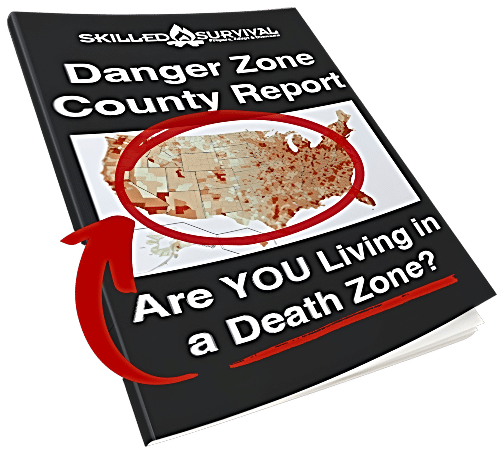
Find out now using my Danger Zone County List & Special Report it’s absolutely FREE.
In minutes you’ll know EXACTLY where you stand and if you should be worried or not..
So click here to get my FREE Danger Zone County List & Report…

Recommended Reading
Best Fuel Storage Ideas: How To Store Extra Gasoline
Long term fuel storage is crucial in all survival situations, but fuels must be stored properly and safely to keep, especially long term gasoline storage.
How To Store Seeds For Wise Prepping & Survival
When seed saving and seed storage, you must do it right. Learn how to store seeds so they'll thrive the next planting season.
Common Everyday Carry Mistakes YOU Must Avoid At All Costs
The only person qualified to build YOUR Best Everyday Carry (EDC) is YOU. To do it right, you must avoid these common mistakes and pitfalls.
Strategic Relocation: How To Find A Safe Pace To Live
Use strategic relocation to find a safe, defendable location to call home. Your choice of location WILL determine your survival fate.
Map Of Nuclear Fallout: Would I Survive A Nuclear Bomb?
Have you seen a map of nuclear fallout? Or run a nuclear simulation to see the damage a nuke would do to your city? If not, check this out.
Homestead Survival: How To Master Plan Your Own Safe Haven
Use this simple 6 step action plan to successfully plan and build a homestead to survive (and thrive) even if the world falls into chaos...
